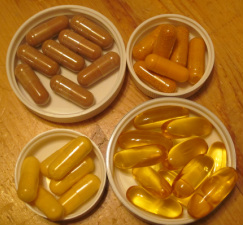
It is also important to note Naturopathic Physicians are highly trained in herbs, vitamins, nutrients, minerals – all of which come in supplement form. Always keep in mind, just because it’s natural does not mean it’s safe and it may interact with current medications and/or supplements.
1. No additives or fillers
Inexpensive supplements are able to be sold at a lower cost because they use a combination of non-therapeutic ingredients to “fill” the extra space left over by the low doses of the intended nutrient. These extra ingredients often consist of sugars, listed under various names as to hide the ingredient from consumers. We have seen some brands of prenatal vitamins that contain red dye and other artificial preservatives which may be harmful to mom and baby. We have provided a list of non-medicinal ingredients from a common
multi-vitamin.
Calcium Carbonate, Potassium Chloride, Dibasic Calcium Phosphate, Magnesium Oxide, Microcrystalline Cellulose, Ascorbic Acid (Vit. C), Ferrous Fumarate, Pregelatinized Corn Starch, dl-Alpha Tocopheryl Acetate (Vit. E). Contains < 2% of: Acacia, Beta-Carotene, BHT, Biotin, Boric Acid, Calcium Pantothenate, Calcium Stearate, Cholecalciferol (Vit. D3), Chromium Picolinate, Citric Acid, Corn Starch, Crospovidone, Cupric Sulfate, Cyanocobalamin (Vit. B12), FD&C Yellow No. 6 Aluminum Lake, Folic Acid, Gelatin, Hydrogenated Palm Oil, Hypromellose, Manganese Sulfate, Medium-Chain Triglycerides, Modified Food Starch, Niacinamide, Nickelous Sulfate, Phytonadione (Vit. K), Polyethylene Glycol, Polyvinyl Alcohol, Potassium Iodide, Pyridoxine Hydrochloride (Vit. B6), Riboflavin (Vit. B2), Silicon Dioxide, Sodium Ascorbate, Sodium Benzoate, Sodium Citrate, Sodium Metavanadate, Sodium Molybdate, Sodium Selenate, Sorbic Acid, Stannous Chloride, Sucrose, Talc, Thiamine Mononitrate (Vit. B1), Titanium Dioxide, Tocopherols, Tribasic Calcium Phosphate, Vitamin A Acetate (Vit. A), Zinc Oxide. May also contain < 2% of: Ascorbyl Palmitate, Maltodextrin, Sodium Aluminosilicate, Sunflower Oil.
Higher quality supplements may cost more, but are not packed full of harmful ingredients and will allow you to achieve the
goals that you have set out by taking the product.
2. Tested for toxins
Currently there are no regulations requiring ‘natural’ health supplements to undergo testing for dosage or toxins that may be found in certain products. The main supplement of concern is fish oil as some fish contain high levels of heavy metal toxins which will be more concentrated in the oil. High quality supplement manufacturers will have their products tested by a third party to ensure that they are not exposing their customers to poisons. They are also tested to guarantee that the dosing on the
label is actually what you are receiving in each capsule. This assures the consumer that they are getting what they pay for and avoiding any potential harm. We prefer to use fish oil sourced from smaller fish like sardines and anchovies which are tested as mentioned above and are more sustainable as well.
Another reason that quality supplements may cost more is that
they contain doses of the wanted ingredients that are high enough to achieve a therapeutic effect. As the cost decreases, often times so does the dose and in order to receive an adequate amount you may have to take up to 10 capsules or tablets per day to reach the same dose as 1 or 2 capsules of the more expensive supplement. When doses are compared directly it usually leads to the discovery that the “expensive” supplements are actually lower in cost – below is a specific example illustrating this point.
We will use omega 3 fish oil as an example again because this is one that is fairly common as it is sold with such a low dose and people buy them thinking that are getting the many health benefits that come
with fish oil when in fact they are most likely getting little to no benefit at all. In most conditions EPA is what gives the therapeutic benefit. Let’s say, for example you bought a 150 capsule bottle of fish oil from a grocery store that contains 180 mg of EPA per capsule in it for $20 and is low quality. You go to your Naturopath and buy a 60 cap bottle of fish oil that has 650 mg of EPA in it per capsule for $30. Therapeutic benefit is usually seen at 1000-2000 mg EPA. So you would have to take about 8 capsules of the low dose fish oil to match 2 caps of the high quality fish oil. That means you would be finished that low quality supplement in about 18 days if you were taking it at a therapeutic dose. So cost wise that’s $1.11 daily for a lower dose and lower quality fish oil with many caps taken daily or $1 daily for only 2 capsules to be taken. In this example and most situations that we have seen the higher quality fish oil taken at a therapeutic dose ends up being less expensive than the “cheaper” store bought brand. To see benefit, higher doses of certain supplements are necessary and this is where talking to a health professional is very important because some supplements at high doses can be harmful.
4. Most absorbable or active form used
Apart from higher doses, quality supplements will also contain the form of nutrient that is most available to be absorbed and
utilized by your body. The “fillers” found in cheaper products may block the absorption of the vitamins, minerals or herbs in to the system, making the ingredient less useful. For example, magnesium oxide is used frequently in lower quality products as this is
the cheapest form, however, it is the least absorbable form so there will likely be little to no benefit seen with this sort of product.
Along with higher doses and the absence of unnecessary ingredients, using the most available form will ensure you are receiving the proper nutrients and better equip you on the journey to achieving your health goals.
Overall, look for supplements that contain no artificial preservatives, artificial flavour or colour, yeast, corn, soy, wheat, gluten, milk, sugar, starch, heavy metals or PCBs. We are not saying you should always buy the most expensive supplements out there as this is not always necessary. We just want to educate you on what to look for when purchasing a supplement. It’s also always a good idea to consult a Naturopathic Doctor or other health professional that is trained in the area before starting a new supplement. We want you to get the best use of your supplement to better your health and improve your quality of life.

 RSS Feed
RSS Feed